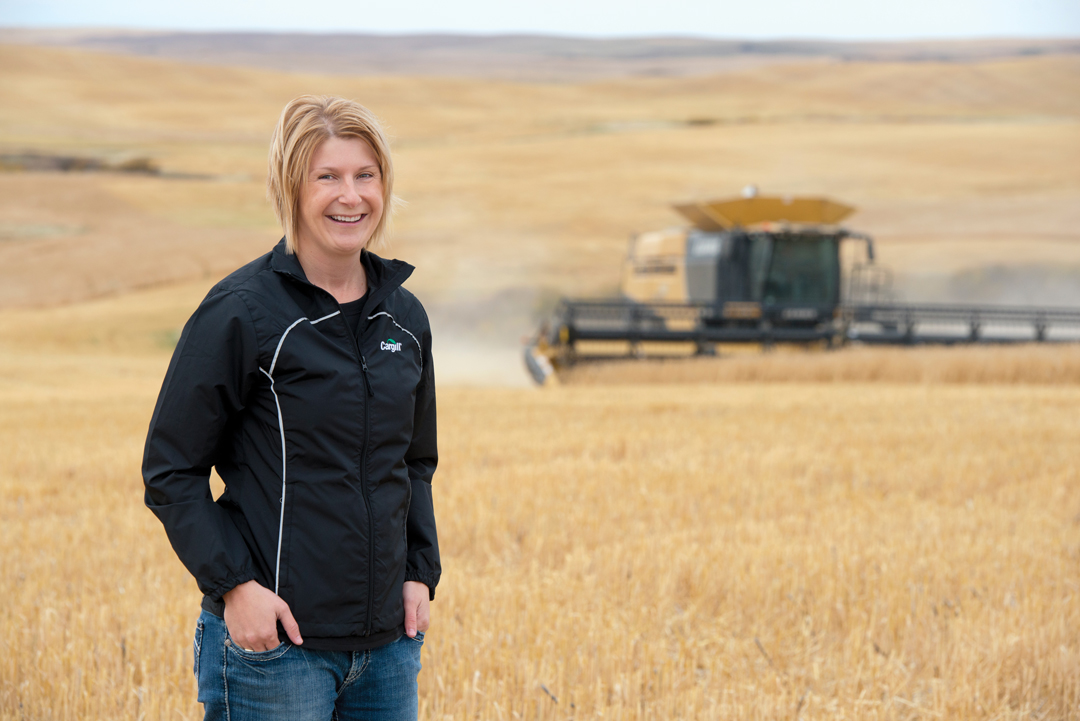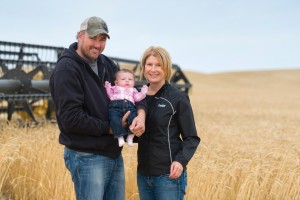CHANTELLE DONAHUE: CARGILL’S DEALMAKER
A GLIMPSE INTO THE LIFE OF ONE OF CANADA’S BUSIEST AG PROFESSIONALS
BY SCOTT ROLLANS
It’s a good thing Chantelle Donahue is used to wearing multiple hats. Because she just added one more.
Donahue, Cargill Canada’s vice-president of corporate affairs, has long been one of our country’s most respected agricultural executives. With her husband Greg, she also farms near Biggar, SK. Meanwhile, in her “spare” time, she serves on more boards than most people have fingers.
Then, last July, she and Greg added a baby to the mix with the arrival of their daughter, Abigail. Like many new moms and dads, the Donahues have discovered that parenthood just might be the biggest job yet.
“I was talking to the folks in High River, where Cargill has the largest cattle-processing facility in Canada,” laughed Chantelle. “I told them my baby is as much work as High River is for me.”
Somehow, you get the feeling that the Donahues will continue to function just fine. For years now, after all, Chantelle has managed to build her Winnipeg-based career while commuting back to Biggar on weekends (plus longer spells during seeding and harvest). Of course, a certain level of creativity comes into play.
“Last year, I was seeding and I had to stop the drill to take a quick conference call for one of the boards,” she said by way of example. “It’s not conventional—let’s put it that way. When Greg goes for coffee with his friends, they probably sometimes wonder a little bit how we’re making it all work. But we do.”
If baby Abigail represents yet another piece of the puzzle, the Donahues are more than up to the challenge.
“Our little girl was a frequent flyer before she was born,” Donahue pointed out, adding that Abigail’s industry debut was at the Canada Grains Council meetings in the third week of November.
“It’s finding that balance, and never losing the broader perspective of why you’re doing this.”
Donahue’s Biggar roots run deep—her parents’ farm is part of the land she and Greg work today—but, growing up in the 1980s, she didn’t picture a career in agriculture. This outlook shifted as she gradually drifted towards the field while in university, eventually earning a business degree with a major in agriculture economics. She planned to follow up with a PhD, and possibly an academic posting, but decided to first spend some time with a private company. She hasn’t looked back since.
It was 2002—a drought year, and not the best time to be job hunting. Nevertheless, Donahue landed a job with Cargill, working as an export merchant out of the Vancouver office. Then, a couple of years later, she jumped at the chance to return to Biggar when a job opened up at Cargill’s Prairie Malt operation.
“That was nice,” she recalled. “It had me at home, and that’s really when Greg and I started farming full time, and started expanding the farm a bit.”
Before long, Donahue was managing Cargill’s entire supply chain for Canadian barley. Then came the promotion to corporate affairs, and the beginning of her rigorous commuting schedule between the Cargill head office in Winnipeg and the farm back in Biggar.
As demanding as that split focus may be, it may also help explain Donahue’s success, suggested Ted Menzies, president and CEO of CropLife Canada (and former Member of Parliament for Macleod, which includes High River).
“I find it fascinating when you meet with someone in their office and it’s all business—and then she can reflect back on what happened on the farm in Biggar last week. She brings it back to what actually matters, on the farm. That, I think, has stood her very well in her career.”
At the same time, Donahue has an unmatched view of the big picture, according to Dennis Laycraft, executive vice-president of the Canadian Cattlemen’s Association.
“Chantelle covers such a wide range of areas within Cargill,” he said. “And Cargill really reaches from one end of the country to the other. She probably sees the issues at a higher level than a lot of other people.”
Laycraft also marvels at Donahue’s seemingly boundless energy.
“I’m sure she gets tired, but she certainly appears to be a tireless advocate. No matter what the occasion requires, she’s there to ensure the issue is dealt with properly.”
Meanwhile, back on the farm, Greg said his wife’s industry-wide outlook has broadened his own perspective, as well.
“You see these tens of thousands of check-off dollars leaving the farm, and you have some realization of where it’s going and people are actually working to get it to the right places,” he said. “It’s nice to have the other view, rather than just what you hear at the coffee shop—which is generally not the whole story.”
For her part, Chantelle cherishes her farm and family for keeping her grounded. Often, while working in Winnipeg or Ottawa, she’ll find herself pausing to think, “OK, is this going to make sense when I bring it back to the farm?”
Not surprisingly, then, she doesn’t draw a stark line between corporate goals and the everyday concerns of producers.
“It took me a while to realize that it’s not about ‘us’ and ‘them.’ It’s about all of us working together to move the value chain, and move the country further. It’s not always easy to see, but if the supply chain collectively is prospering, and is bringing value to the marketplace, that in itself will bring long-term success to the industry.”
She points to the sector’s ongoing challenge in transitioning through the Canadian Wheat Board monopoly.
“It’s been a few years now, and I would say we’re all still learning,” she said. “We needed to walk, not run, and build trust throughout the process. But, as we work through that, our ability to be candid and show our value in what we can do has been important. The industry is coming together well.”
As a farmer at the other end, Greg tends to agree.
“You have to spend a lot of time looking at information—that’s probably the biggest change. If you don’t keep up-to-date, you might get blindsided a bit. But if you read, and keep yourself educated, you have a pretty good idea of what is coming and how to work through it. It actually hasn’t been that bad at all.”
Both Donahues are excited for the future of Canadian agriculture, particularly given the technological advances of recent years.
“In the past 10 years, canola yields around here have basically doubled,” Greg observed. “That’s huge.”
Although canola is clearly a special case, Chantelle looks forward to eventual advances in Canadian grains, as well.
“Over the past five years, there have been some really great agronomic traits bred into wheat,” she observed. “There’s more that can be done.”
Despite the global undercurrents and concerns around GMOs, Donahue sees biotechnology as a key component of sustainability.
“The key there is sticking to sound principles of science. Those are the baselines for trade, and that’s what we try to work towards,” she explained. “That’s why it’s so important that we work as an industry. Because one farm, or one company, can’t do that, and the government alone can’t do it. It needs to be the entire value chain—right from seed producer and crop protection company, through to producers, grain handlers, government—all working together.”
The future hangs in the balance, added Donahue.
“How do we keep this entire value chain in Canada profitable, and growing, so that when our little girl is our age, she has the opportunity to farm if she wants?”
Fortunately, Donahue believes Canada is up to the task.
“We stand out internationally for our ability to come together.”
She and Greg feel a shared sense of purpose on the home front, as well.
“I hope, as our daughter Abigail grows up, she can see that and appreciate that,” said Donahue. “It’s not going to be necessarily easy to find that balance, but we’re committed to doing it, and making sure that she has both parents actively involved with her.”
Although Abigail will determine her own future, Chantelle would be thrilled to see her eventually follow in her parents’ footsteps.
“She was five or six days old, and we had her out in the field scouting crops with us.
“She has agriculture in her blood.”









Comments